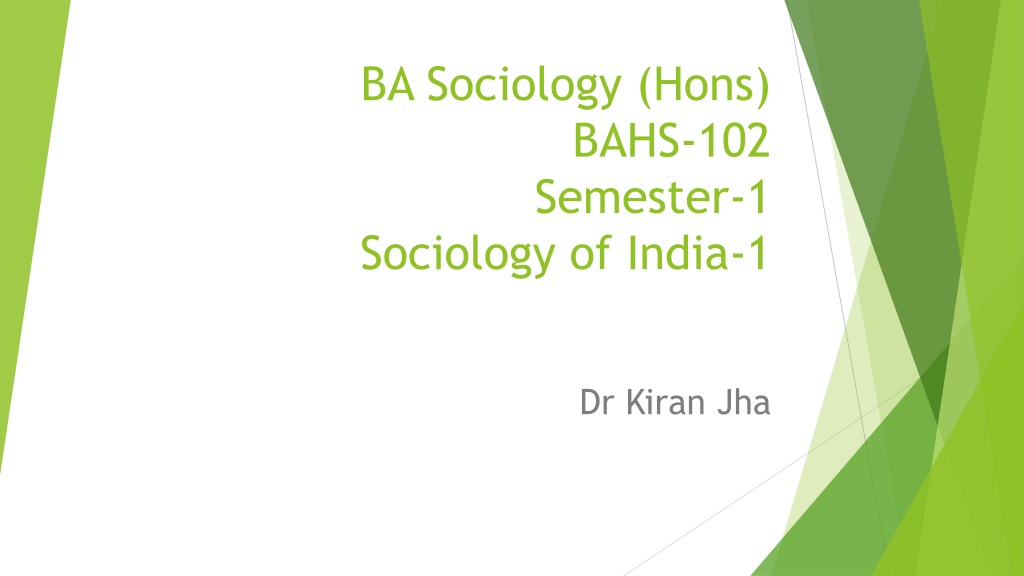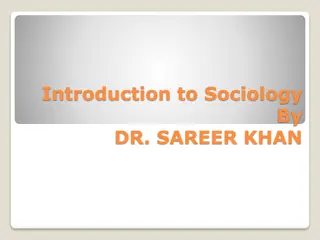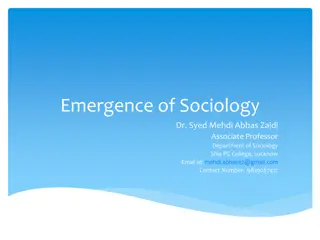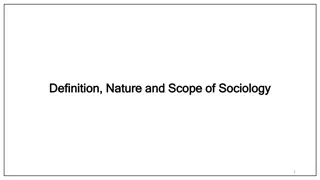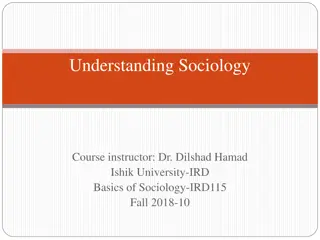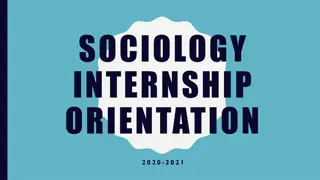Historical Development of Sociology in India: Phases and Significance
The historical development of Sociology in India is explored through key phases from 1773 to 1950. The first phase, characterized by ethnographic research, laid the foundation for Sociology, Anthropology, and Indology. The second phase witnessed the growth of Sociology as a profession with empirical studies and the establishment of Sociology as an academic discipline in various universities. Despite challenges, Indian sociologists adapted Western methods to study local contexts, paving the way for future advancements in the field.
Download Presentation

Please find below an Image/Link to download the presentation.
The content on the website is provided AS IS for your information and personal use only. It may not be sold, licensed, or shared on other websites without obtaining consent from the author. Download presentation by click this link. If you encounter any issues during the download, it is possible that the publisher has removed the file from their server.
E N D
Presentation Transcript
BA Sociology (Hons) BAHS-102 Semester-1 Sociology of India-1 Dr Kiran Jha
Unit 1 Historical Development of Sociology in India First Phase _ 1773 1900 ( The foundation period) Ethnographic details of Indians began to be collected Contribution of Henry Verelst -1769 Stressed the importance of collecting information regarding the life and culture of Indians, William Jones _ Asiatic Society of Bengal -1787 Carried out oriental research, Francis Buchanan 1807- Conducted ethnographic survey of Bengal, Abbe Dubois _ 1816- Wrote Hindu manners, Customs and Ceremonies and was one of the first to study caste First all India census in1871, Herbert Risley s ethnographic survey of 1901 and the arguments for it Caste based census started but discontinued after 1931 as it was seen to be creating divisions in the society
Importance of this period Administrative needs of the British were fulfilled through these studies as it was helpful in framing policies Led to the development of Sociology, Anthropology and Indology Growth of self respect and self confidence among the Indian elite with discovery of India s past Reaction to Missionaries among Indians Rise of Nationalism and an urge for social reform
Second Phase Second Phase _ 1900- 1950 (Growth of Sociology as a Profession) Growth of empirical studies in this period W. H. R. Rivers study of the Todas, Radcliffe Brown s Andaman Islanders, S. C. Roy s study on tribes of Bihar Academic discipline of Sociology started in various universities starting from 1914 in University of Bombay ( G.S. Ghurye, K. M. Kapadia, Irawati Karve ) Calcutta and Mysore University -1917 Lucknow University -1921 (Radhakamal Mukerjee, D.P. Mukherjee, D. N. Majumdar) Pune University late 1930s ( Irawati Karve) Osmania University 1946 ( Haimendorf and S. C. Dube)
Disabilities Not too many job opportunities in Sociology Sociologists steeped in British traditions, ignored other influences from Europe and America Sociology seen as a subject that created divisions in society Being studied by anthropologists meant being primitive Importance of the period Indian Sociologists adapted western methods to study Indian situations Very few sociologists in this period but they were dedicated teachers, researchers and critics
Third Phase Third phase Post Independence Period from 1950 (Greater research activity) Sociology grew in popularity and many more universities started departments of Sociology Establishment of National Planning Commission in 1950, had a great impact in raising awareness of social sciences Central Social Welfare Board, Commission for SC/ST, Tribal Research Institutes, Community Development Programmes, all needed sociologists Establishment of Indian Sociological Society in 1951 led to more professionalization Establishment of ICSSR in 1969 Sociology and social anthropology grew more popular
Important development in this period Emergence of a distinct theoretical line gave new insights regarding various phenomena like caste, family, religion etc. Revealed ideas of uniformity in different parts of the country But also highlighted the diversities in various regions Micro studies conducted by Kathleen Gough, F. G. Bailey, S. C. Dubey T. Scarlett Epstein Growth of different branches of Sociology Study of Social Change and also Continuity
Material used in these slides have been based on : 1. Cohn, Bernard. 1990. An Anthropologist among the Historians and Other essays. OUP Delhi 2. Srinivas M. N. and M. N. Panini. The Development of Sociology and Social Anthropology in India. In Indian Sociology : Reflections and Introspections, edited by T. K. Oomen and Partha N. Mukherji. Bombay: Popular Prakashan, 1986, pp. 16-55. First published in Sociological Bulletin, Vol.22, No.1, pp. 179-215
